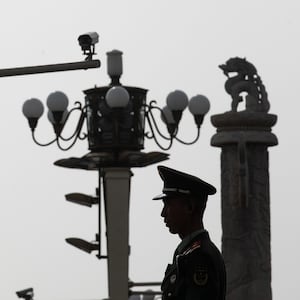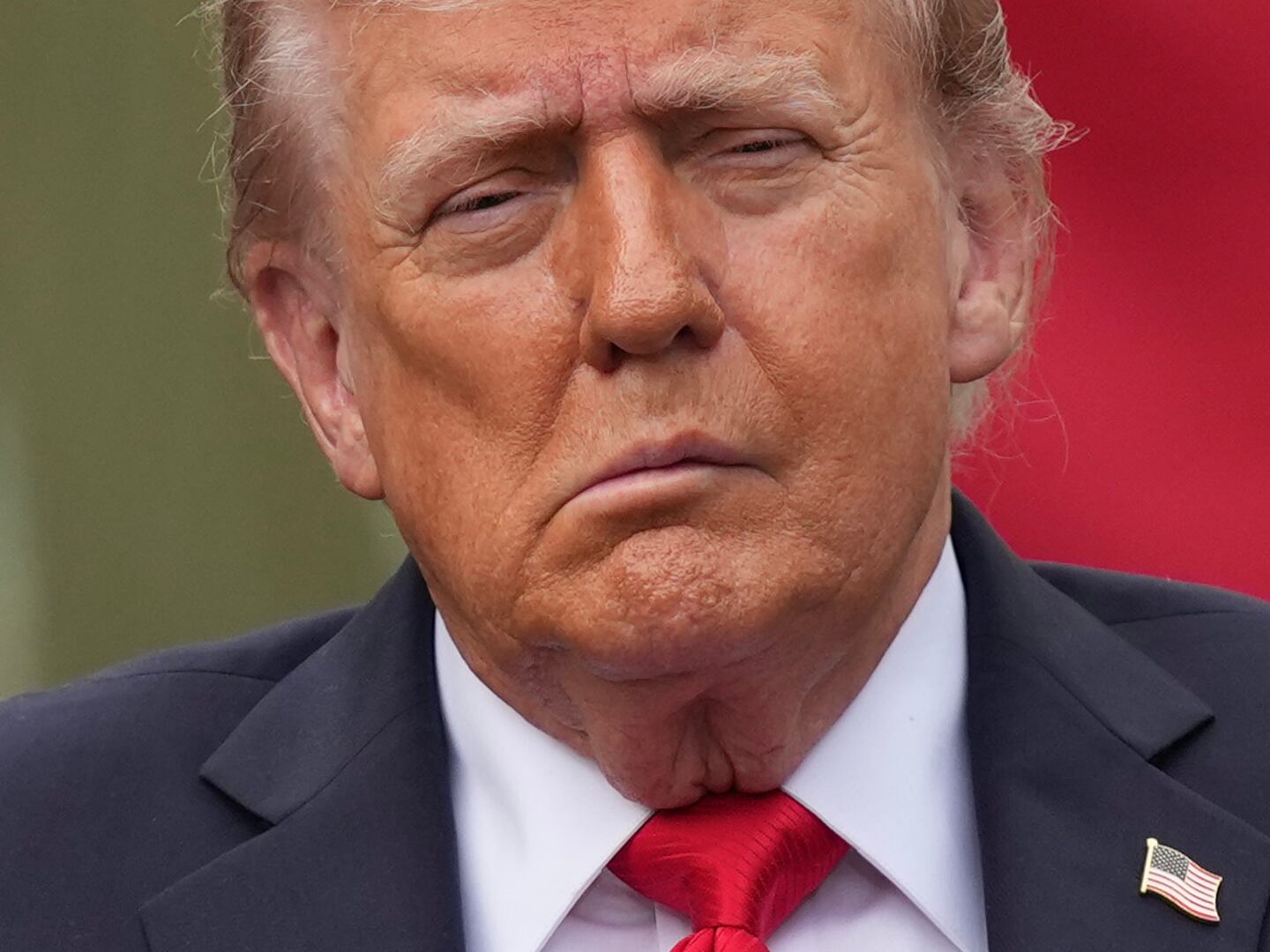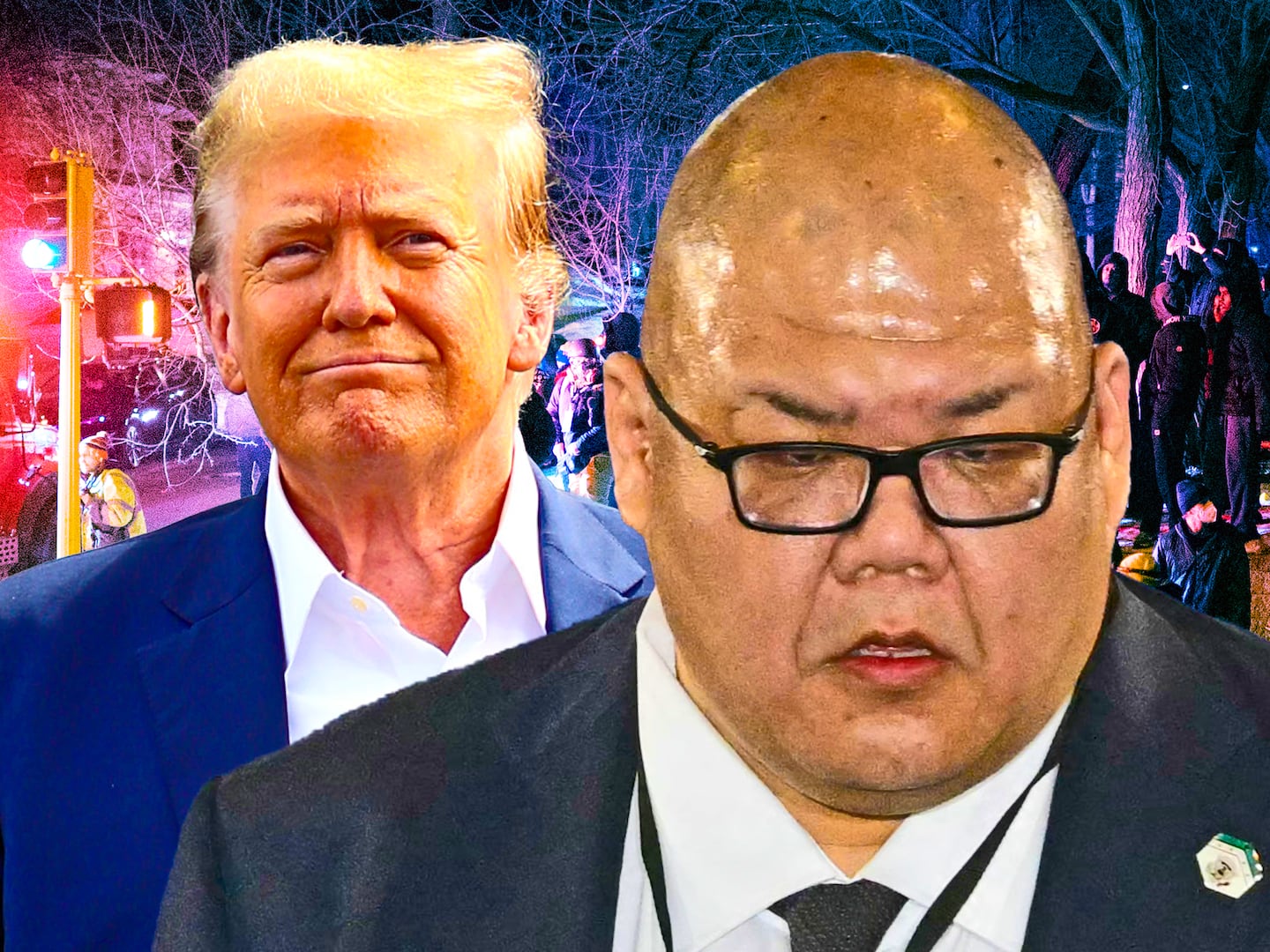In November 2020, as he deceitfully insisted he had won re-election, Donald Trump gestured at ending the Afghanistan war. He purged several senior Pentagon appointees and installed as acting defense secretary a thematically apt choice.
The new acting secretary was a longtime counterterrorism figure named Chris Miller. A Green Beret colonel before he entered the vast security bureaucracy, Miller personally gave as much to the War on Terror as anyone has. He was among the advance deployment of special operators who arrived in Afghanistan ahead of the October 2001 invasion. His official biography describes “numerous follow-on deployments” to both Afghanistan and Iraq; the precise details are classified. Miller’s last-minute elevation to the penultimate position in the chain of command had bypassed the Senate-confirmed deputy defense secretary and was legally questionable.
Speaking in the Pentagon briefing room for the first time, Miller hailed Trump for having arrived at a “successful and responsible conclusion” to the United States’ longest foreign war. He hailed the sacrifices of American troops and left after eight minutes without taking questions.
Trump’s primary preoccupation at that moment was not Afghanistan but stealing the presidency. He pursued his task characteristically: through cultivating a mass hysteria and daring the politicians he had bent to his will to challenge him and his movement. No national Republican politician of any stature was willing to tell him to stop his flagrant assault on constitutional governance. So it stood in glaring contrast that several of them, including Senate GOP leader Mitch McConnell, demanded that Trump not go through with the withdrawal. Their Democratic opposition twisted itself in knots to say that while of course they supported a responsible end to the war, Trump was engaged in what Senator Tammy Duckworth, an army veteran who had lost her legs in the Iraq war, called “a reckless, chaotic drawdown.”
Amid a war that had lasted an entire generation, everyone played what were by now grimly familiar political roles. Reluctance to ending the constellation of post-9/11 military conflicts was bipartisan, broad, and instinctive in Washington. Trump, however obstreperous he was about it, proved no exception. Despite Miller’s grandiose rhetoric, the president was not ending the war in Afghanistan at all, but merely reducing the U.S. troop commitment there from five thousand to thirty-five hundred by the time Joe Biden took office. Trump was even undercutting what had been the most valorous act of his disgraceful presidency, an accord with the Taliban that tethered U.S. withdrawal to reciprocal Taliban measures and, pivotally, an inter-Afghan peace process. In Iraq, Trump was removing even fewer forces. Syria went unmentioned. Trump would be the third president to hand the Forever War—a term that was at first derisive but grew more accepted as the point became harder to contest—to his successor.
Throughout his presidency, Trump was often misperceived as being an opponent of the War on Terror. He owed that reputation to his vocal derision of “stupid” Mideast wars. Yet in office he escalated the war dramatically, intensifying aerial bombing campaigns across multiple war zones, particularly in Somalia, where the war had never been fought as intensely as under Trump. One study, in December 2020, found that Trump’s accelerated bombing had increased civilian casualties in Afghanistan by 330 percent. Military commanders faced fewer operational restrictions and transparency obligations. In 2019 the president deployed an additional fourteen thousand U.S. troops to the Mideast as part of a pressure campaign against Iran, the War on Terror’s white whale, that culminated in the assassination of its senior security official. Every time Trump proposed withdrawal—even once declaring an ongoing war over—he ultimately acquiesced to the objections of the military leadership. Before sensibly suing for peace with the Taliban, he even doubled troop levels in Afghanistan, the Forever War theater he claimed to hate the most.
It was hardly the first time in Trump’s career that he convinced people that the truth was the opposite of what the evidence told them. But Trump’s durable anti-war persona derived from nothing that he did and only from what he said. For many the propaganda of “Donald the Dove,” as The New York Times’ Maureen Dowd infamously described him, was convenient. Trump’s justifiers, determined to dominate the broad institutional machinery of the state, needed to portray it as bloodthirsty and inept. Their opponents did the rest of the work. Liberals, who tended to identify with that machinery, wanted to view Trump as a deviation from American history, a man in political and perhaps even financial debt to foreign adversaries, someone incapable of acting in the national interest. They used Trump’s rejections of the counsel of generals and spymasters to demonstrate their point. Rarely did they pause to consider the merits of continuing wars they had long stopped believing in.
Trump understood something about the War on Terror that they did not. He recognized that the 9/11 era’s grotesque subtext—the perception of nonwhites as alien marauders, even as conquerors, from a hostile foreign civilization—was its engine. As much as Trump shifted his positions on this or that conflict, he never wavered on that crucial insight. Appearing on Howard Stern’s radio show for the first anniversary of 9/11, a period when U.S. foreign policy was the geopolitical equivalent of a psychotic episode, Trump surveyed all the changes to national security and lamented, “I’m not sure things are any tougher.”
His problem was that the psychosis he encouraged had revealed not the might of America, but its weakness. For those millions of Americans who demanded vengeance for 9/11, and then for the United States’ compounded misfortunes in seeking it, the Forever War brought only the pain and humiliation of attaining neither peace nor victory.
The pursuit of vengeance not only created new enemies that America failed to vanquish. It also created more ambitious ones, who had their own ideas about vengeance. Yet it was beyond the limits of respectable discourse to blame the Forever War for giving birth to new generations of forever enemies. The agony of the war outlasted the enthusiasm of the political, media, cultural, and intellectual elites who had hailed it as the Great War of Our Time, a grand national, even civilizational crusade against… something Islamic that hated freedom, or at the very least hated America. In the early years after 9/11, they even treated the open-ended nature of the war as a virtue, a Kennedyesque challenge for a reunited America that was finished with the frivolity of the 1990s, something that could prove American could again accomplish anything, no matter how arduous the struggle. Even after that delusion died in Iraq, the fallback position among the politically powerful was that extrication was more dangerous than quagmire. A circumscribed, managed quagmire could even ultimately comport with America’s broader hegemonic position of open-ended foreign deployments pursued in the name of what Washington called the “rules-based international order.” They were so implicated in providing neither peace nor victory that it would be easy to discredit them in the eyes of those to whom that was intolerable: the people who had listened to what they said.
Being unable to defeat this something-Islamic was intolerable for a people accustomed to thinking of itself as exceptional, for whom uncontested American supremacy had existed long enough that it seemed as inevitable as the weather. The painful condition of neither peace nor victory, against an enemy seen as practically subhuman, itself required vengeance. Trump offered himself as its instrument. Declaring his presidential candidacy in his golden tower, he asked, “When was the last time the U.S. won at anything?”
A war that lasted for an entire generation was typically defined in a reductive, misleading fashion. It was not simply something that happened on the battlefields of Iraq and Afghanistan, or Pakistan, or Yemen, or Somalia, or Libya, or Syria, or Niger. It was something that happened inside the United States. It was the construction, institutionalization, and maintenance of surveillance at a scale unimaginable a generation earlier; indefinite detention without charge; remote assassination of foreigners and then American citizens; law-enforcement infiltration of communities, businesses, and even houses of worship to generate informants; expansive categories of criminal association, but only for certain people; the treatment of immigration as a national security threat; a public wealth transfer to the military and associated security services estimated in 2019 to total over $6 trillion; incommunicado detention; and torture. The war routinized official euphemisms and outright government lies about whom it targeted, the scale of its operations, their second-order impacts, and their prospects for success. It withheld the relevant truths about the war as official secrets. And it encouraged an atmosphere of paranoia that frequently turned conspiratorial.
The effect was to create a patriotic veil of unreality to conceal the damage done to American exceptionalism—particularly the self-inflicted damage. Long before Trump, the War on Terror revealed how the manipulation of reality and the normalization of atrocity would proceed. Trump brought aspects of the war home, but fundamentally the war was always home. For the 9/11 generation, the first generation to be extremely online, the War on Terror was an early red pill, releasing an omnidirectional, violent nihilism that viewed itself as the only rational, sophisticated, honorable, and even civilized option. Its culture was one of outrage, self-congratulation, and obedience to authority that convinced itself it was transgressive. I have to admit that after 9/11 I swallowed that red pill myself. Even after I thought I spat it out over the carnage of Iraq, it took me years to recognize its lingering effects. In retrospect, any failure—especially by the war’s architects, stewards, and chroniclers—to see that the War on Terror was seeding the ground for a figure like Trump testifies to the power of American exceptionalism, which is nothing more than white innocence applied globally.
Occasionally the legal and political structures that, in a mature democracy, were supposed to constrain this apparatus succeeded in rolling back some of its operations. More often they reacted deferentially, leaving the bedrock of the War on Terror intact. As they did, they incrementally hollowed out the institutions all this security machinery was predicated on augmenting. Trump lay in wait for a brittle America that told itself it was resilient. The same tools that destabilized foreign countries were bound to destabilize America. Trump was the War on Terror’s lagging indicator, the promise of what George W. Bush unleashed and what Barack Obama nurtured.
Experiencing neither peace nor victory for such a sustained period was a volatile condition for millions of people. Trump knew how to explain such humiliations: The War on Terror was an enraging story of insufficient brutality wielded by untrustworthy elites. Those elites, he claimed, pretended that America was not at war with Islam, that it was not experiencing a foreign invasion, that it was not at risk, in the final analysis, of being itself lost. If America could not defeat its enemies abroad, there were so many here at home: Muslims, nonwhite immigrants, brown people from what Trump called “shithole” countries, queer and especially trans people, Black people, socialists, liberals, Jews. A war that never defined its enemy became an opportunity for the so-called MAGA coalition of white Americans to merge their grievances in an atmosphere of righteous emergency. That impulse unlocked a panoply of authoritarian possibilities that extended far beyond the War on Terror, from stealing children to inciting a violent mob to attempting to overturn a presidential election. Those options were enabled by how deeply the Forever War had eroded the legal, political, cultural, and economic armor protecting American democracy. By December 2020, one of the men who could credibly say he had waged the War on Terror at its worst, retired army lieutenant general Mike Flynn, promoted a demand for Trump to suspend the Constitution in order to remain in office.
One of the insignia of that wartime coalition was the racist slander known as birtherism. Birtherism, which held that the first Black president was secretly a Kenyan Muslim noncitizen, was a fortress surrounding white anxiety made of anti-Black racism, Islamophobia, and xenophobia. The mortar of birtherism was the War on Terror, since it cast Obama as an enemy of the United States who had usurped its highest office.
Yet even as he was birtherism’s target, Obama perpetuated the War on Terror, as if the politics of one could be separated from the other. He treated the War on Terror like a plane that was unsafe thirty thousand feet above the ground but whose flight could be acceptably steady at ten thousand. Even as he kept the aircraft airborne—and gave it a legacy for liberals to follow—he seemed to recognize its danger. “A perpetual war,” Obama observed in May 2013, would “prove self-defeating, and alter our country in troubling ways.” A great tragedy of Obama’s presidency is that this insight did not guide his actions.
Trump did not hesitate to act on his insights. In the plague year of 2020, he maneuvered the War on Terror onto newer domestic frontiers. He declared followers of popular movements against fascism and for Black liberation to be terrorists. When the military leadership balked at opening fire on Americans, Trump turned to the Justice Department and the quintessential creation of the War on Terror: the Department of Homeland Security. Suddenly, minimally identified government forces, kitted out for war, conducted widespread surveillance over American cities, shot protesters with “less-lethal” rounds, abducted them off the streets, and, in one instance, executed a man instead of apprehending him. It showed Trump’s true intentions toward the War on Terror: not to end it, but to make it an instrument of his will.
The War on Terror was by no means the only factor enabling Trump’s rise. But it was a path to power for the others. It revitalized the most barbarous currents in American history, gave them renewed purpose, and set them on the march, an army in search of its general. This book tells the story of that campaign. It is the story of a compounded and often improvised tragedy, rather than an intentional conspiracy, that implicates an entire generation of American leaders through either action or acquiescence. Their central blind spot emerged from the American exceptionalism at the heart of the War on Terror: to believe that the damage they inflicted abroad would not damage their own country. In that they followed a historical pattern. “People are surprised, they become indignant,” Aimé Césaire observed in 1950:
<p>“They say: ‘How strange! But never mind—it’s Nazism, it will pass!’ And they wait, and they hope; and they hide the truth from themselves, that it is barbarism, but the supreme barbarism, the crowning barbarism that sums up all the daily barbarisms; that it is Nazism, yes, but that before they were its victims, they were its accomplices; that they tolerated that Nazism before it was inflicted on them, that they absolved it, shut their eyes to it, legitimized it, because, until then, it had been applied only to non-European peoples; that they have cultivated that Nazism, that they are responsible for it, and that before engulfing the whole of Western, Christian civilization in its reddened waters, it oozes, seeps, and trickles from every crack.”</p>
Trump and MAGA, for now, are out of power. The War on Terror is not. Left alone, it will continue to produce neither peace nor victory; it will remain the soil from which to cultivate more and worse Trumps. Of all the endless costs of terrorism, the most important is the least tallied: what fighting it has cost our democracy. How like America it is not to recognize that the true threat was counterterrorism, not terrorism.
In 2020, I asked Stanley McChrystal, the former Joint Special Operations Command and Afghanistan War commander, if the War on Terror had been worth it. “It would be impossible to argue that it was,” he answered. “The outcome just hasn’t been positive enough to argue that. I think that we can never know a counterfactual, we can never know what would have happened if we’d gone in and done things differently, so I can’t argue it automatically would have been different. I think the things that were done with good intentions, mostly. But no. We just made so many fundamental mistakes in how we approached it that the question is, which again, you and I can’t answer, had we gone in with a different mindset, a totally different approach, which would have been more of a counterinsurgency approach, building through the state, would it have worked? I can’t say it would’ve, but I think it would have been a better approach.”
Until the entire War on Terror is abolished—not only the foreign military deployments, but the broader entrenched architecture of surveillance, detention, immigration suppression, and the rest—it will propel itself toward greater domestic destabilization. Inertia alone is sufficient to power it. We should not assume the Forever War has reached its final form. If the United States is ever to recover from the destruction it unleashed not only on the world but on itself, and primarily on its most vulnerable, it must first understand the post-9/11 era as nothing other than a reign of terror.

From REIGN OF TERROR by Spencer Ackerman, to be published on August 10, 2021 by Viking, an imprint of Penguin Publishing Group, a division of Penguin Random House, LLC. Copyright © 2021 by Spencer Ackerman.






